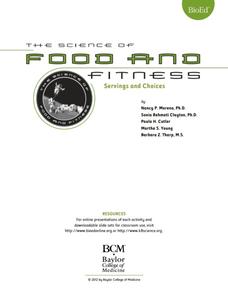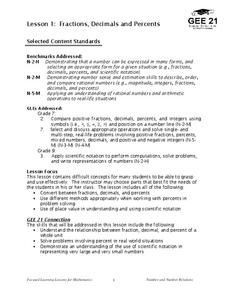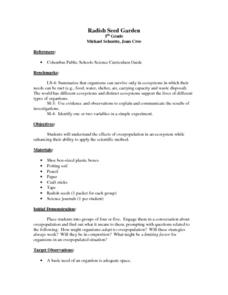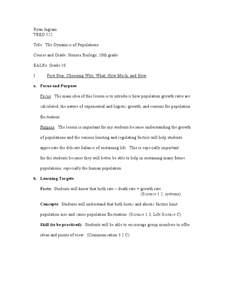Illustrative Mathematics
Equivalent Expressions?
Pre-algebra pupils need to understand that two expressions are only equal if they have the same value. Show them that once the expression is multiplied by a number, the value of the expression changes. It makes for a good lead-in to...
Baylor College
Servings and Choices
An important part of balancing caloric intake to energy expenditure is knowing how many Calories you are consuming. In the fifth of a seven-lesson series on food and energy, learners estimate their daily caloric intake, then use a...
Curated OER
Cliches, Paradoxes
Clichés, paradoxes, and equivocations are detailed in a short, animated video that defines and illustrates these writing traps. The resource also includes a quiz and the transcript for the video. Users can register to access free course...
Education Outside
Our Water Planet
Fresh water is a precious resource. Most kids don't realize how little of the water on Earth is actually drinkable. This lesson will help to illuminate them on this important topic. They discus the ratio of water to land, where most...
Louisiana Department of Education
Fractions, Decimals, and Percents
Fractions, decimals, and percents all say the same thing! Show your classes how to convert between the three forms using visual and numeric representations. Then lead them to an understanding of scientific notation.
Computer Science Unplugged
Phylogenetics
Introduce your class to the concept of creating phylogenetic trees by playing a game of Telephone. Participants create a mixed-up message and through the use of distance matrices, the evolution of the message is recreated.
Jordan School District
Who is Worth More Than Gold?
Young writers compose an opinion piece that details who they feel is worth more than gold.
Curated OER
Denying Civil Rights
High schoolers continue their examination of the United States Constitution. Individually, they identify events in which the government has limited our civil rights and write an essay. In groups, they debate the issue and answer...
Curated OER
How Distant is the Moon?--2
Learners examine total eclipses of the Sun and their limited regions of totality. They explain that this limited view occurs because the Moon is close enough to us for different points on Earth to view it differently.
Curated OER
Rockets on a Shoestring Budgut
Students work together to create rockets on a budget. They discover the limitations that real engineers face when designing and testing their products. They discuss their findings to complete the lesson.
Curated OER
Radish Seed Garden
Fifth graders explore the effects of overpopulation in an ecosystem while applying the scientific method. They discuss overpopulation and its meaning. Students as an organism competes for space in an overpopulated area. They plant...
Curated OER
How Did That Get There?
High schoolers evaluate the role of government in addressing land use and other environmental issues. They analyze the powers, responsibilities, and limitations of elected and appointed officials in the national legislative, executive,...
Curated OER
The "Right" Ideas
Learners explain five rights guaranteed to them by the Bill of Rights. They describe their own views on the right to limit some of our guaranteed rights. They finally describe the role of a nonprofit organization and how they promote our...
Curated OER
Water-our Precious Resource
Young scholars complete a unit of lessons on water as a limited resource. They conduct Internet research, record information in electronic journals, utilize spreadsheets, conserve water and record the results, and conduct water safety...
Curated OER
What Happens on Average
Fifth graders are introduced to convergence of sequences based on averaging previous terms in the sequence. The power of the "fill-down" function in spreadsheets is exploited. By using various starting numbers, and inferring the limit,...
Curated OER
The Government and Natural Rights
Young scholars are introduced to some basic ideas the Framers used in creating the kind of government they thought would best protect the natural rights of each individual and promote the good of all. At the conclusion of the lesson...
Curated OER
Individual Rights -- Freedom of Speech at School
Students examine their individual rights at a public school. In groups, they identify the most common ways of expressing themselves and why they should limit their speech in public. They compare and contrast two cases in which they...
Curated OER
The Dynamics of Populations
Tenth graders analyze the growth rate of different population. In this biology experiment, 10th graders identify the biotic and abiotic factors that limit population size. They create a poster to show their findings in class.
Curated OER
Worm Composting: Vermiculture
Students compost in a limited space and describe the decomposing process. Students convert unwanted, organic matter, particularly food scraps and paper into fertile soil.
Curated OER
Indians and African Americans 1780-1820
Young scholars explain that opportunities for African Americans remained severely limited by slavery until 1783. They examine the 1783 Massachusetts abolishment of slavery and its impact.
Curated OER
Giving: Putting the Pieces Together
Fourth graders examine the gifts they might give to friends and family. They choose personal mementos to give and consider the limits of their gift-giving circle.
Curated OER
Where Has All the Water Gone?
Middle schoolers identify how we use water everyday. They determine the amount of water used in different activities. They finally explain why the water supply is limited and how we can conserve water.
Curated OER
Alternative Power Project
Tenth graders identify existing forms of energy and create possible solutions to resource limitations.
Curated OER
Design a Paraplegic Equestrian Saddle
Students investigate a problem and background information including the typical capabilities /limitations of a paraplegic. They develop an understanding of the attributes of engineering design.
Other popular searches
- Calculus Limits
- Pre Calculus Limits
- Limits and Continuity
- Pre Calculus With Limits
- Legal Limits
- Limits on Populations
- Functions and Limits
- Limits to Population Growth
- Limits Composite Functions
- Sexual Limits
- Constitutional Limits
- Pre Calculus Limits

























